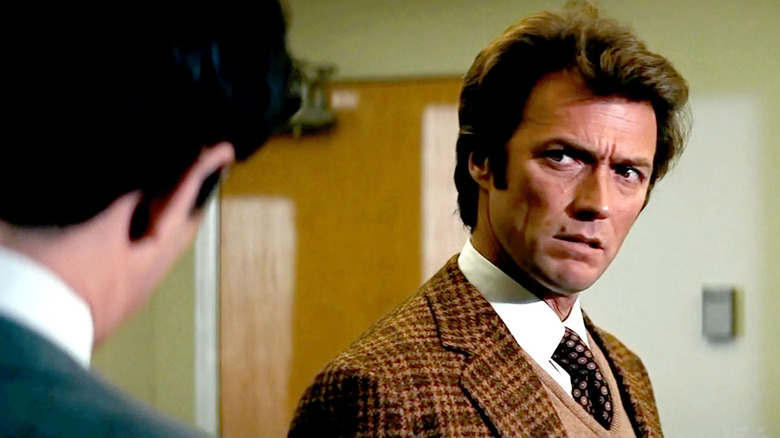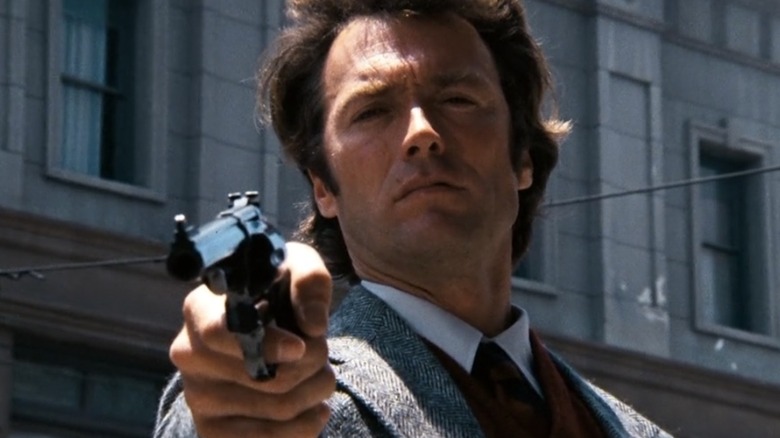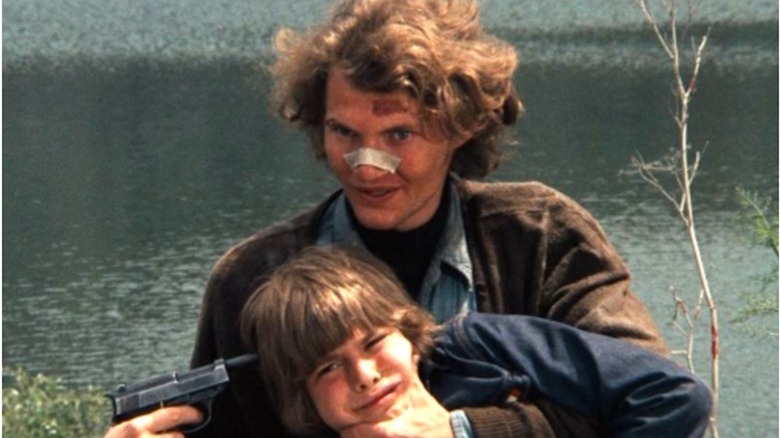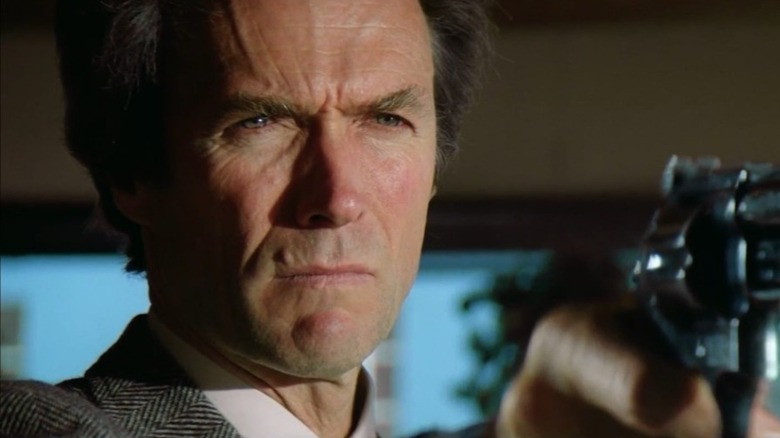Clint Eastwood Has Strong Feelings About Critics Calling Dirty Harry A 'Fascist Film'
When The New Yorker's Pauline Kael wrote of Don Siegel's "Dirty Harry" in 1971 that the American cop thriller "has always had a fascist potential, and it has finally surfaced," she kicked off a fierce debate about the genre that still roils today.
Taken at face value, it's difficult to dispute that the film is meant to titillate viewers with the ultimate, judge-jury-executioner justice pursued and dispensed by Clint Eastwood's Harry Callahan. He despises the Miranda Warning, and complains that the United States' judicial system has been corrupted to favor the rights of criminals. The screenplay, credited to Harry Julian Fink, R.M. Fink, and Dean Riesner (with a crucial, uncredited assist from John Milius and, according to Milius, Terrence Malick of all people), stacks the deck to a ludicrous degree by having Andrew Robinson's Scorpio Killer orchestrate an act of police brutality late in the movie to get Callahan kicked off the case. At this moment, it feels like we're meant to throw our hands up and support the inspector's final decision to off the murderous scumbag — one whose hippie-fied long hair and shabby attire is starkly contrasted by Callahan's suits and smartly maintained locks.
Then there's Callahan's racism, which gets explained away by a fellow cop as equal-opportunity misanthropy. Harry hates everyone. This certainly seems to be the case, but the film's cavalier use of racial invective to score a cheap laugh even now lands most palpably with white viewers frustrated with political correctness. Can't these people take a joke? Perhaps if they hadn't been tormented as youths for the color of their skin or their place of worship –- or occasionally harassed by cops for "fitting the description" –- they'd find humor in Harry's pissy demeanor.
An unorthodox cop for an unorthodox time
In any event, "Dirty Harry" was a massive success for Warner Bros., launching a spate of vigilante exploitation flicks calibrated to slake a certain segment of the public's thirst for law and order by any means necessary. And while Clint Eastwood loathed the critics' charges of fascism, in an interview with Patrick McGilligan, he expressed his own desire for extrajudicial punishment.
When McGilligan asked Eastwood if he was at all bothered by the dialogue surrounding "Dirty Harry," the star dismissed the notion that it endorses any kind of political worldview because, in his estimation, the film doesn't have one. "Those people are crazy," he said. "The people who call it a fascist film don't know what they're talking about. They're just mouthing off... there's nothing like that in there."
Eastwood went on to defend Callahan's "unorthodox" actions by observing that his character is up against a ticking clock with Scorpio. The longer he waits to bring him in, the more likely he is to kill more people. Callahan swore an oath to protect and serve the people of San Francisco, and if this means he has to resort to torture to get information out of people, so be it. His personal moral code trump due process. The ends justify the means.
Eastwood goes to Nuremberg
This led Clint Eastwood to draw an iffy parallel with the prosecution of Nazis in the wake of World War II. I'll let the actor speak for himself:
"We, as Americans, went to Nuremberg and convicted people who committed certain crimes because they didn't adhere to a higher morality; we convicted them on that basis –- that they shouldn't have listened to the law of the land or their leaders at that time. They should have listened to the true morality. We sent them to jail on that basis. This is how it is with this man. Somebody told him this is the way it is, too bad, and he said, 'Well, that's wrong. I can't adhere to that.' That isn't fascist, that's the opposite of fascism."
Eastwood's analogy doesn't make a lick of sense. The Nuremberg trials were, well, trials. The charter was adopted to punish members of the Nazi government and party in general for cruelly calculated war crimes. The leeway granted for things like hearsay evidence was unusual, but so were the heinous actions of the Nazis. It wasn't about adhering to a higher morality, but rather capitulating to the basest of hatreds –- and exterminating millions of innocent people on this basis.
Scorpio is clearly evil, but he is also an extreme example, as well as a lone wolf. Someone like Adolf Hitler or, on a far more miniscule level, Charles Manson posed a greater danger to society for the dangerous cult of personality they built up around themselves. In "Dirty Harry," Scorpio gets off on taunting law enforcement, but he's not trying to turn the public against cops. Even if that was his goal, why bother? Cops have always been better at ticking off the general public via excessive use of force than the criminals they apprehend.
If it patrols like a fascist...
Clint Eastwood's protective stance with "Dirty Harry" is understandable. The first film was a box office sensation that launched an immensely profitable franchise for him, and its depiction of Harry is anything but an endorsement of his behavior. His colleagues disapprove of his methods, and he is forthright about his own disillusioned view of law enforcement. When he's asked why he's still a cop despite his abhorrence for procedure, he says "I don't know, I really don't." At the end of the film, after he blasts Scorpio with the final bullet in the chamber of his absurdly powerful .44 magnum, he hurls his badge into a quarry.
The only reading of this scene that makes sense to me is that Harry is quitting because he can't execute perps based on his view of common morality (in this case, the reasonable belief that unrepentant serial murderers should be removed from society). The law will not allow him to be the monster civilization needs to protect it from monsters.
This is a pernicious notion. In Don Siegel's film, and the many formulaic cop flicks and TV shows that've come out since, we've been made to believe that we're under siege. Crime is rampant, and we'd all be living in lawless dystopia if not for the dutiful efforts of our local police. The truth is that we need cops to keep the peace, but we can't afford a single gunslinging cowboy like "Dirty" Harry Callahan to walk the beat. Due process is a pain in the ass. And it is easily corrupted (especially by the wealthy). But it's better than having self-appointed executioners rendering judgment based on a "higher morality." That means operating above the law. And that, Mr. Eastwood, is fascism.



